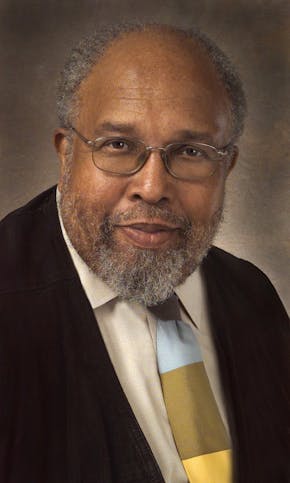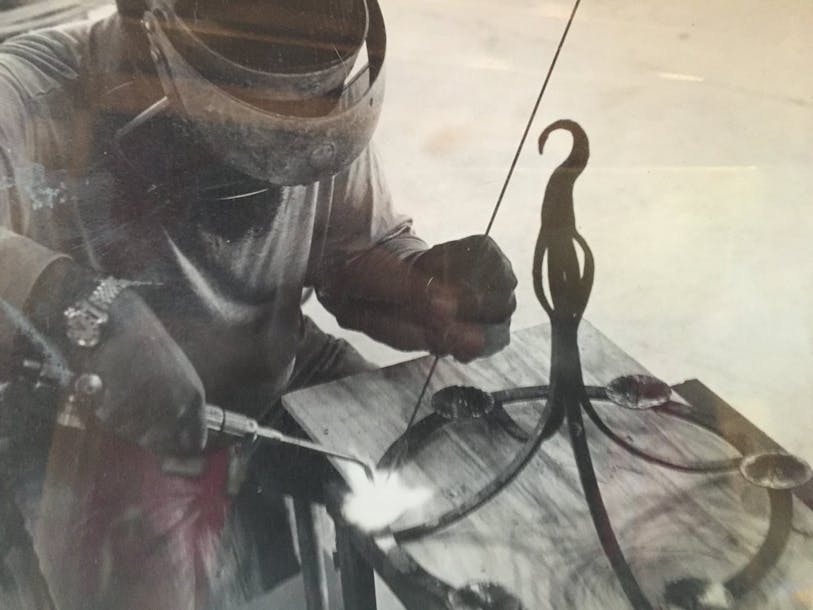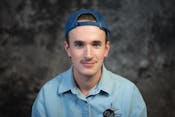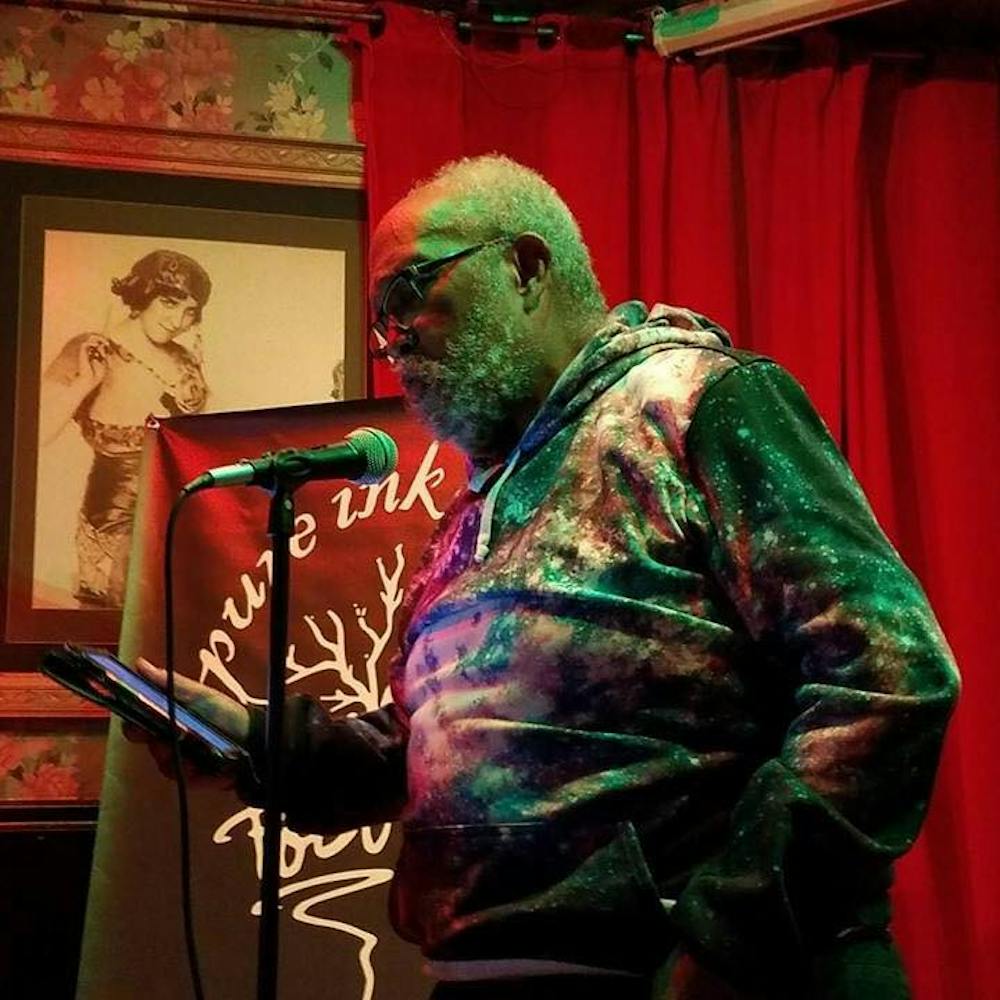Dr. Scott Williams has mastered just about everything he’s set his mind to.
Blacksmithing. Poetry. Mathematics.
When it comes to his craft, Williams embraces it.
But Williams laughs at the idea of being a renaissance man.
“My ego would get too big if I was,” Williams said.
Williams is a professor emeritus in UB’s mathematics department, joining the university in 1971 and retiring in 2013. Aside from his four decades as an award-winning research professor, Williams has navigated life’s maze and embraced teachings of philosophy, art and craftsmanship. It’s all built into his career as a poet, a craft best seen during his Second Stage Writers series, a series he helped found that embraces a myriad of readers regardless of their identity.
And this love for the arts and sciences has no boundaries. It was built in his DNA.
His mother, Beryl, was the first African American to graduate with a degree in mathematics from the University of Maine. His father, Roger, was one of the first African Americans to earn a Ph.D. in psychology at Pennsylvania State University.
While growing up in Baltimore, Maryland, Williams’ family exposed him to the arts and mathematics. Williams said he would play arithmetic games with his uncle as a child and always loved the field. In the late ‘50s, he attended high school at Baltimore City College.
But, Williams said he had teachers who tried to undercut his intellect while in school.
“When I got 156 on an IQ exam, they didn't believe it was possible,” Williams said.
So he took the test again.
“I got a 164,” Williams said.
Williams continued onward with his early-founded passion in mathematics after high school at Baltimore’s Morgan State University.
He learned from Dr. Volodymir Bohun-Chudyniv, a Russian immigrant who Williams worked with on non-associative algebraic research.
“The desire to learn surely came from my parents. However, by introducing [me] to advanced mathematics in my early teens, Bohun-Chudyniv stimulated deep logical processes,” Williams said.
Williams also studied under passionate mentors at Morgan State, such as Dr. Clarence Stephens. Stephens is known for his popular teaching style, which increased the number of graduating mathematics majors at SUNY Potsdam by 20 times the national average, according to SUNY Potsdam’s website. After Morgan State, Williams earned a Ph.D. at Lehigh University in 1969. He went to Penn State for his post-doctorate and then applied for jobs at over 60 schools, including UB.
He said five of the schools were interested in him, including Harvard, Princeton and Yale.
UB heard about the competition and made Williams an offer.
But faculty and staff, he said, still doubted him because UB hired him through its Affirmative Action plan.
“I came here and people originally had low expectations, so they were shocked after my work on the famous problem,” Williams said.
In the ‘70s, Williams worked on the Box Product Problem, a problem that has historically gone unsolved by mathematicians.
Williams was the first to use the notion of scales to the problem, which is on his “Million Buck Problems” list. Williams’ list values problems at $1 million or more to the field of mathematics. In 1981, Williams won the SUNY Chancellor’s Award for Excellence in Teaching, the highest honor for an instructor in the SUNY system.

Williams said some of the “best memories of his life” took place with former UB faculty members, too. He said he, alongside Stephen Schanuel and Samuel Schack, would look at “some of the world’s greatest mathematics problems” and have lengthy discussions at a local coffee shop toward the latter part of his UB career.
In addition to his time at UB, Williams’ research on everything from topology to dynamics led to lecture invites from universities around the world. Williams lectured through a 1986-87 Fulbright fellowship in Prague, Czechoslovakia and taught at Beijing Teacher's College in China from 1988-91.
Dr. Judith Roitman, a former mathematician and professor at the University of Kansas and friend and colleague of Williams, attended a number of conferences with Williams around the world from Toronto to Europe. Roitman said Williams’ character stands out, despite the racism he faced in his field.
“In the early ‘70s, we were at a conference and someone who invited him to be a speaker gave him an introduction. He said something like ‘He’s a negro, but he’s a good mathematician anyways,’ and then he had to stand up and give his talk,” Roitman said. “But he just gave his talk after. I was just saying to myself, ‘If that was me I would start crying.’ So he had to deal with all these incredible things in [his field].”
Williams has gone above and beyond to show the work of black achievements in academia. In 1995, he designed his site Mathematicians of the African Diaspora. The site displays black academic achievements in mathematics and also covers philosophy and black history.
Williams created the site after he noticed another site on African American achievements lacking mathematical representation.
“Some of the greatest mathematicians I knew, African American mathematicians, weren’t on that site. So I said I’ve got to change this, and that’s how that whole website started,” Williams said.
Williams also lives a life set by philosopher George Gurdjieff. The philosophy, Williams said, is a mixture of Eastern methods and science. He said he began following the lifestyle in the 1970s, around the same time he came to UB.
By chance, he joined a nearby school that practiced Gurdjieff’s teachings –– the Rochester Folk Art Guild, a craftsman’s guild. It was there where Williams learned under Louise Goepfert March, one of Gurdjieff’s students.
At the craftsman’s guild, Williams took on work as an artist-blacksmith from 1972-83 while at UB. Williams is still a member of the guild and said some of his projects have been featured around the nation, including at the Smithsonian Gallery. Today, he holds meetings for a group inspired by Gurdjieff’s teachings.

“Gurdjieff's teachings emphasized an interior balance of the mental, emotional and the physical, it is this balance that has played directly into my person,” Williams said.
The craftsmanship isn’t the only art form Williams has explored. Along with his poetry readings, Williams wrote a number of chapbooks, including “Bonvibre Haiku” as well as an anthology of flash fiction and speculative poetry: “A Flash of Dark.”
Williams said the first poet he ever read was Harlem Renaissance poet Jean Toomer, also a student of Gurdjieff. Aside from black revolutionaries like Buffalo’s Ishmael Reed and ghazal writers like Robert Bly, Rochester writer Martha Heyneman’s past 15 years of poetry teachings have also influenced Williams.
David Landrey, a local poet, said Williams’ readings are unique and there’s no one writing quite like him.
“He has an ear that is different from the rest of us, he’s hearing sounds that the rest of us don’t hear,” Landrey said. “He was a metalworker at one point, he recreates the sounds in his poems, the ‘wamp, wamp, ding, ding, ding ding.’ You’re there in the studio with him doing his work, but it feels like you’ve been transported.”
Landrey said during a conversation, Williams said he had to “turn his emotions off completely” in mathematics whereas poetry “unleashes” his emotions.
As Williams attended more poetry events after retirement, he noticed three kinds of events in the area. One crowd included African Americans, another included people over 40 years old and another included people under 40 years old.
Williams then made a list, citing the races, genders and ages he wanted to see included at poetry events.
“I set out to create a venue, where one of each of these people would be there,” Williams said. “Some of the people [at the event] would satisfy two of these categories like a young gay person or an older black person. What I’ve done, very carefully, is set it up so all these conditions are satisfied.”
The program he helped create, Second Stage Writers, is an inclusive set of poetry readings that has not repeated any readers since its creation in 2017, Williams said.
Williams said he doesn’t expect any repeating readers for another year and a half.
Second Stage Writers takes place on the second Friday of every month at Grindhaus Cafe on Allen Street. More information on the series’ upcoming events can be found on Second Stage Writers’ Facebook page.
Benjamin Blanchet is the engagement editor and can be reached benjamin.blanchet@ubspectrum.com and on Twitter @BenjaminUBSpec

Benjamin Blanchet is the senior engagement editor for The Spectrum. His words have been seen in The Buffalo News (Gusto) and The Sun newspapers of Western New York. Loves cryptoquip and double-doubles.





